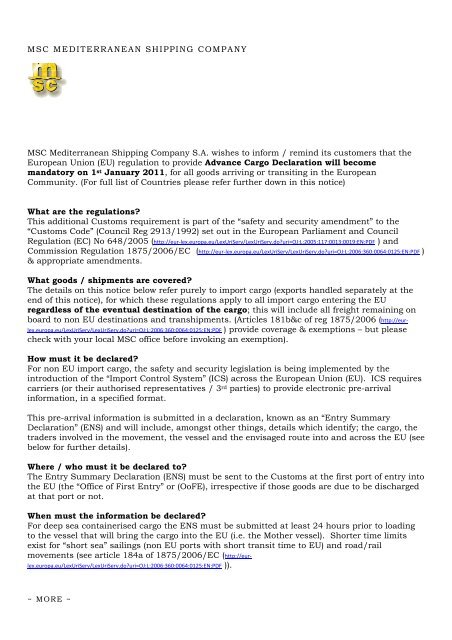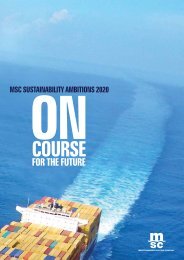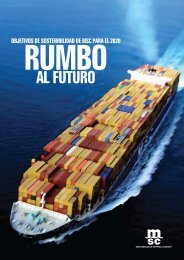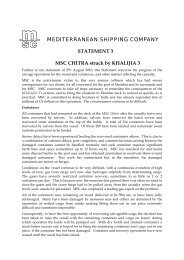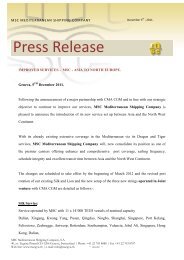Glossary of Terms - Mediterranean Shipping Company SA
Glossary of Terms - Mediterranean Shipping Company SA
Glossary of Terms - Mediterranean Shipping Company SA
Create successful ePaper yourself
Turn your PDF publications into a flip-book with our unique Google optimized e-Paper software.
MSC MEDITERRANEAN SHIPPING COMPANY<br />
MSC <strong>Mediterranean</strong> <strong>Shipping</strong> <strong>Company</strong> S.A. wishes to inform / remind its customers that the<br />
European Union (EU) regulation to provide Advance Cargo Declaration will become<br />
mandatory on 1 st January 2011, for all goods arriving or transiting in the European<br />
Community. (For full list <strong>of</strong> Countries please refer further down in this notice)<br />
What are the regulations?<br />
This additional Customs requirement is part <strong>of</strong> the “safety and security amendment” to the<br />
“Customs Code” (Council Reg 2913/1992) set out in the European Parliament and Council<br />
Regulation (EC) No 648/2005 (http://eur‐lex.europa.eu/LexUriServ/LexUriServ.do?uri=OJ:L:2005:117:0013:0019:EN:PDF ) and<br />
Commission Regulation 1875/2006/EC (http://eur‐lex.europa.eu/LexUriServ/LexUriServ.do?uri=OJ:L:2006:360:0064:0125:EN:PDF )<br />
& appropriate amendments.<br />
What goods / shipments are covered?<br />
The details on this notice below refer purely to import cargo (exports handled separately at the<br />
end <strong>of</strong> this notice), for which these regulations apply to all import cargo entering the EU<br />
regardless <strong>of</strong> the eventual destination <strong>of</strong> the cargo; this will include all freight remaining on<br />
board to non EU destinations and transhipments. (Articles 181b&c <strong>of</strong> reg 1875/2006 (http://eur‐<br />
lex.europa.eu/LexUriServ/LexUriServ.do?uri=OJ:L:2006:360:0064:0125:EN:PDF ) provide coverage & exemptions – but please<br />
check with your local MSC <strong>of</strong>fice before invoking an exemption).<br />
How must it be declared?<br />
For non EU import cargo, the safety and security legislation is being implemented by the<br />
introduction <strong>of</strong> the “Import Control System” (ICS) across the European Union (EU). ICS requires<br />
carriers (or their authorised representatives / 3 rd parties) to provide electronic pre-arrival<br />
information, in a specified format.<br />
This pre-arrival information is submitted in a declaration, known as an “Entry Summary<br />
Declaration” (ENS) and will include, amongst other things, details which identify; the cargo, the<br />
traders involved in the movement, the vessel and the envisaged route into and across the EU (see<br />
below for further details).<br />
Where / who must it be declared to?<br />
The Entry Summary Declaration (ENS) must be sent to the Customs at the first port <strong>of</strong> entry into<br />
the EU (the “Office <strong>of</strong> First Entry” or (OoFE), irrespective if those goods are due to be discharged<br />
at that port or not.<br />
When must the information be declared?<br />
For deep sea containerised cargo the ENS must be submitted at least 24 hours prior to loading<br />
to the vessel that will bring the cargo into the EU (i.e. the Mother vessel). Shorter time limits<br />
exist for “short sea” sailings (non EU ports with short transit time to EU) and road/rail<br />
movements (see article 184a <strong>of</strong> 1875/2006/EC (http://eur‐<br />
lex.europa.eu/LexUriServ/LexUriServ.do?uri=OJ:L:2006:360:0064:0125:EN:PDF )).<br />
~ MORE ~
~ MORE ~<br />
Page 2<br />
What action will Customs take?<br />
This time frame will allow Customs to use agreed EU wide common risk rules to perform risk<br />
analysis on the pre-arrival information, contained in the ENS, and any appropriate safety and<br />
security data being passed to other EU Member States where they are identified as being<br />
included in the itinerary <strong>of</strong> the means <strong>of</strong> transport. Subject to the outcome <strong>of</strong> that risk<br />
assessment, Customs will decide if a consignment causes such a threat to the EU that the goods<br />
will be issued with one <strong>of</strong> the following Risk categories:<br />
• Risk A – Loading <strong>of</strong> cargo refused (Do not load message - DNL)<br />
• Risk B – Risk handled in the first EU port (e.g. Unloading for exam, irrespective if this<br />
shipment was due to discharge at that port or not)<br />
• Risk C – Risk handled in the intended port <strong>of</strong> discharge (e.g. Examination)<br />
Who is responsible to submit the declaration?<br />
The legal responsibility for ensuring an ENS is submitted (& within the time limits) lies with the<br />
carrier or “operator <strong>of</strong> the active means <strong>of</strong> transport”, however it can also be made by a<br />
representative or third party, but only with the carrier’s knowledge and consent, where a<br />
third party is authorised by the carrier to submit ENS’s on their behalf. (See article 36b (3&4) <strong>of</strong><br />
reg 648/2005 (http://eur‐lex.europa.eu/LexUriServ/LexUriServ.do?uri=OJ:L:2005:117:0013:0019:EN:PDF ))<br />
Can I submit the declaration myself?<br />
Should you wish to make your own ENS filing you will need prior contractual agreement with<br />
<strong>Mediterranean</strong> <strong>Shipping</strong> <strong>Company</strong> S.A. and ensure accuracy & completeness. (Note: you will<br />
need to ensure the MSC Economic Operators Registration & Identification Number (EORI) is duly<br />
inserted inside your filings and ensure that MSC will receive the Movement Reference Number<br />
(MRN) involved)<br />
Who is responsible for the information & what must be declared?<br />
The accuracy and completeness <strong>of</strong> the ENS filing lies with the declarant <strong>of</strong> the ENS, who is<br />
entitled to base their ENS filing on data provided by its trading or contracting parties. E.g. the<br />
booking information you provide to MSC when we are to file ENS; below is a list <strong>of</strong> key items<br />
required (the complete list <strong>of</strong> all data elements can be found in annex 30a <strong>of</strong> reg 1875/2006<br />
(http://eur‐lex.europa.eu/LexUriServ/LexUriServ.do?uri=OJ:L:2006:360:0064:0125:EN:PDF ))<br />
• Clear, accurate description <strong>of</strong> goods<br />
• 6 Digit Harmonised System Commodity code (must be one for each separate item & not<br />
amalgamated under one )<br />
• UN dangerous goods code (as applicable)<br />
• EORI number (see below) <strong>of</strong> all appropriate parties<br />
• Package description or code (as detailed in Annex 38)<br />
If your company is a holder <strong>of</strong> an Authorized Economic Operator (AEO) Certificate please<br />
contact us and we will assist you to see if you are entitled to use reduced data<br />
requirements.<br />
Additional Information / links<br />
An EORI number is a number, unique throughout the European Community, assigned by a<br />
customs authority in a Member State to economic operators (businesses) or persons, by<br />
registering for customs purposes in one Member State. More information available on this link:<br />
http://ec.europa.eu/taxation_customs/dds/eorinumval_en.htm
Page 3<br />
A movement reference number (MRN) is automatically issued to the declarant <strong>of</strong> the ENS (&<br />
carrier if different) by an acknowledgement message from Customs ICS system upon successful<br />
validation <strong>of</strong> the ENS.<br />
The “Entry Key” consists <strong>of</strong> the below two items, which will be available from your local MSC<br />
<strong>of</strong>fice:<br />
• IMO (International Maritime Organization) number – used as identification reference <strong>of</strong> the<br />
mother vessel bringing goods in to the EU<br />
• First anticipated date <strong>of</strong> arrival at Office <strong>of</strong> First Entry( OoFE) – this is purely a “reference”<br />
date, and once set by MSC it will not change for the purposes <strong>of</strong> the ENS irrespective <strong>of</strong><br />
changes to the vessels actual due date <strong>of</strong> arrival (when requesting this date for your own<br />
3 rd party ENS filing please ensure you differentiate from the actual ETA <strong>of</strong> vessel)<br />
A full list <strong>of</strong> EU member states<br />
Austria<br />
Belgium<br />
Bulgaria<br />
Cyprus<br />
Czech Republic<br />
Denmark<br />
Estonia<br />
Finland<br />
France<br />
~ MORE ~<br />
Germany<br />
Greece<br />
Hungary<br />
Ireland<br />
Italy<br />
Latvia<br />
Lithuania<br />
Luxemburg<br />
Malta<br />
Netherlands<br />
Poland<br />
Portugal<br />
Romania<br />
Slovakia<br />
Slovenia<br />
Spain<br />
Sweden<br />
United Kingdom<br />
Whilst Norway and Switzerland are not EU member states they have adopted these EU<br />
regulations to be included in the ICS process <strong>of</strong> sending & receiving risk, safety & security<br />
information by, for example, including safety & security information on existing customs<br />
declarations used (e.g. Transit / NCTS) for arrivals from EU member states. At time <strong>of</strong><br />
publishing, specific details for the ICS process <strong>of</strong> arrivals direct from other non EU member<br />
states has yet to be verified by Customs.<br />
Regulation 648/2005 is available from:<br />
http://eur‐lex.europa.eu/LexUriServ/LexUriServ.do?uri=OJ:L:2005:117:0013:0019:EN:PDF)<br />
Regulation 1875/2006 is available from:<br />
http://eur‐lex.europa.eu/LexUriServ/LexUriServ.do?uri=OJ:L:2006:360:0064:0125:EN:PDF<br />
Exports<br />
The safety & security legislation for Exports from the EU has already been implemented by the<br />
introduction <strong>of</strong> the “Export Control System” (ECS); where all goods leaving the EU require<br />
electronic lodgement <strong>of</strong> pre-departure information (similar to the data for imports) with Customs,<br />
usually at port <strong>of</strong> Export 24 hours prior to loading to vessel / mode <strong>of</strong> transport that will take<br />
goods out <strong>of</strong> EU. (As with imports shorter time limits may apply).<br />
Many member states have been compliant with ECS since the EU Commissions legislated date <strong>of</strong><br />
1 st July 2009 (last member state complying January 2010) by, for example, simply adding ECS<br />
data fields onto the existing export declarations to create a dual export declaration and ECS<br />
safety & security information declaration.<br />
Currently, most <strong>of</strong> the safety & security information is not submitted for goods that do not<br />
require an export declaration (for example: shippers own empty containers or transhipments on<br />
quay over 14 days) as, in the absence <strong>of</strong> an export declaration there are no means to lodge such
Page 4<br />
information. Therefore from 1 st January 2011 it will become mandatory to lodge safety &<br />
security information on such shipments by the submission <strong>of</strong> a safety & security information<br />
only declaration (not a full export declaration) known as a pure “Export Summary declaration”<br />
(EXS).<br />
As Customs <strong>of</strong> each EU member state are handling the ECS process differently, we respectfully<br />
request that you refer to your local MSC <strong>of</strong>fice who will be able to advise you directly how this is<br />
being implemented in that country.<br />
___________________________<br />
<strong>Glossary</strong> <strong>of</strong> <strong>Terms</strong><br />
AEO - Authorised Economic Operator<br />
EORI - Economic Operators Registration & Identification<br />
MRN - Movement Reference Number<br />
ICS - Import Control System<br />
ECS - Export Control System<br />
EXS – Exit Summary Declaration<br />
ENS – Entry Summary Declaration<br />
OoFE – Office <strong>of</strong> First Entry


